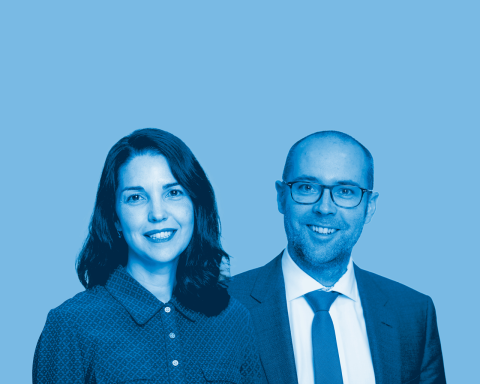
Published
Dr Anne ter Wal tells us how networks have been hit by the coronavirus (COVID-19) pandemic and why technology cannot replace face-to-face interactions in the workplace
The pandemic has put interpersonal relationships under the spotlight. Large swathes of people across the world have been limited, at some point, to interacting with friends, family and colleagues via a screen, and for many, this physical distance was one of the hardest aspects of the coronavirus (COVID-19) pandemic.
Associate Professor of Technology & Innovation Management at Imperial Business School Anne ter Wal focuses much of his research on networks and how individuals use them to access new knowledge and develop new ideas. As the academic lead on a large-scale EU-funded research project titled "Networking for Innovation", he studies how entrepreneurs and innovators build valuable networks that help them achieve business and innovation success.
For him, the pandemic has thrown up fundamental questions around the value of spending time with colleagues and networking in person as opposed to restricting this time to online interactions.
“I think many organisations have realised they can work pretty well with most of their workforce at home, at least in the short run” he says. “But there’s a major challenge around allowing individuals the flexibility of home working while at the same time ensuring there’s enough of a critical mass in the workplace to allow us to sustain what’s good about being together.
“If you’re in the same room with somebody, discussing something, your phone’s not there, you’re fully present in the moment. If you’re behind a screen, there are so many other things that could distract from the core purpose.”
The value of face-to-face interactions
Losing this presence in the workplace, Dr ter Wal believes, could particularly affect those working in innovation and R&D and, as a result, there may be a general lull in creative output. He cites Bell Labs, the US industrial research and scientific development powerhouse responsible for some of the 20th century’s most significant inventions, as an example of how networking in person can be key to an organisation’s success.
“The layout of the building was designed in such a way that people working in different labs would bump into one another, strike up a conversation and get new projects started,” he says. “The logic of networks was core to how the organisation operated.”
There is a hidden layer of more selective clubs, forums, and networks where entrepreneurs support one another
A more recent example – the development of the mRNA vaccine – also supports this theory. Katalin Kariko, a Hungarian biochemist who specialises in RNA-mediated mechanisms met Drew Weissman, a fellow academic, while they were both using the same microfiche machine to read scientific papers. After striking up a professional relationship, together they went on to achieve one of the major breakthroughs that, years later, paved the way for the development of the mRNA COVID-19 vaccine.
“Being in the same place at the same time kickstarted their relationship and enabled them to overcome lots of hurdles, because the very idea they were pursuing was not accepted or supported by the wider academic community at the time,” says Dr ter Wal.
This, he argues, shows how professional relationships, particularly those developed face-to-face, can play a significant role in advancing science, engineering and innovation.
Mounting pressure on innovation
Beyond the lasting effects of the pandemic, Dr ter Wal sees another, perhaps more major, threat to innovation: a growing pressure to demonstrate the feasibility of new ideas. Many organisations, he says, are demanding results very early on in the development process but some ideas require more time and space for experimentation.
“When you’re trying to do things that haven’t been done before, it is inevitable that you will have people who are sceptical and tell you, this is never going to work,” he says. “To a certain extent the greatest innovations and inventions have come out of very basic research; they did not start out with the question, how is this going to matter?”
These kinds of pressures can be very difficult to manage and if they become overwhelming could even contribute to great ideas, and potentially major breakthroughs, being thrown away. This is another situation, Dr ter Wal, says, where people need very strong networks, both for emotional encouragement and for under-the-radar support, so that important ideas can be kept alive.
His current research, looking into entrepreneurial ecosystems, ties together some of these themes. Along with his team of PhD students, postdoctoral researchers and collaborators, he is investigating how entrepreneurs who operate in opportunity-rich ecosystems, such as London’s TechCity, can access the most valuable or most helpful connections.
If you’re in the same room with somebody, discussing something, you’re fully present in the moment
“Behind the abundant networking events and activities at the surface in places like TechCity, there is a hidden layer of more selective clubs, forums, and networks where entrepreneurs support one another or can connect with prospective investors. My research is starting to unveil the strategies entrepreneurs use to discover and access those hidden layers.”
The importance of professional relationships and how to build them has been of particular relevance as a result of the pandemic and Dr ter Wal doesn’t want to entirely dismiss the role technology has played in helping us maintain relations. He does, however, recognise its limitations.
“I see online forms of networking as a support tool and of course, it has been an extremely important one in the past year and a half.
“But the question of whether technology enables the death of distance comes up every few years, and the answer, time and again, is no.”



